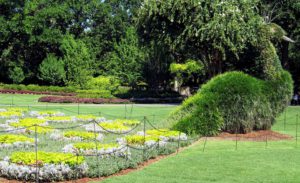The Benefits of Using Vinegar in the Garden

Vinegar is used in so many ways around the home, but do you know that vinegar can be used in our gardens as well to help resolve many garden issues? This all-natural remedy has proven time and again its benefits not only in our indoor living space but outdoors as well. If you are facing these listed issues in your garden and are looking not only for an inexpensive way but a safe and effective approach to remedy these concerns then look no further you have come to the right place to get the results you’re searching for.
14 Ways to Use Vinegar in Your Garden
1. Ants Control: Ants are busy little insects that are hard at work all day long, these small creatures can be found in so many places including our homes. But ants have also been known to invade our landscapes and gardens building anthills forging for food along with looking for water. Fire ants are more common in gardens and will deliver a painful bite if you’re not careful, to control or deter ants fill a 32 0z spray bottle with half vinegar and water. This solution can be applied to anthills. Ensure when spraying that a generous amount is applied (drench). Vinegar and water can also be sprayed around garden beds (vegetables or flowers) and around sidewalks and other areas outdoors where ants are tracking.
2. Seed Germination: Some plant seeds can present a challenge when the time comes to germinate, to speed up the germination process soak tough seeds such as corn, okras, peas, pumpkins, beets, squash, nasturtiums, beans, cucumbers, etc… the seeds should be soaked overnight in a bowl of water with a few drops of vinegar. The seeds can be planted the following day.
3. Deter Animals: Animals can turn a dream garden into a nightmare, to keep animals at bay such as cats, dogs, rabbits, and raccoons soak a few items in vinegar and place them around the perimeter of your garden. Animals find the scent of white vinegar to be unpleasant and will keep their distance from your garden.
4. Rid your Garden of Snails and Slugs: Snails and slugs can do lots of damage to plants, especially our edible garden plants, to eliminate snails and slugs spray them with vinegar and water that’s in a 32 0z spray bottle.
5. Cleaning Clay Pots: Clay or terracotta pots are great to keep the soil cool, especially during times of hot weather, clay pots are known to absorb calcium, salt, and other minerals that leave a white stain or residue on the outside of pots. Soaking your clay pots for half an hour in four cups of water and vinegar will remove these white stains.
6. Eliminate Weeds from Sidewalks and Driveways: Weeds can become a nuisance along with being unsightly and a harborage for insect pests including mosquitoes. Remove weeds from these areas by apply pure white vinegar where weeds are spotted.
7. Preserve Fresh Cut Flowers: Cut flowers can brighten up an indoor living area but to preserve these cut flowers so they can last longer fill your flower vase with 2 tablespoons of sugar and white vinegar and one quart of water.
8. Clean Rusted Tools: Good quality garden tools are a great investment but to keep these tools performing their best requires the proper maintenance. If your garden tools, for example, hand travel have rust soak overnight in undiluted vinegar, spigots can also be soaked in vinegar as well.
9. Feed Acidic Plants: Plants that love acidic soil can be treated with vinegar, mix together a solution of 1 gallon of water and a cup of white vinegar. Apply to a 32 0z spray bottle and treat or spray azaleas, rhododendron, hollies, and gardenias.
10. Clean and Wash Vegetables: Bring your vegetable indoors from your garden and wash them off with a solution of a tablespoon of white vinegar and a quart of water. This mixture will eliminate dirt and bacteria.
11. Protect Fruit Trees: If fruit flies are a nuisance mix a solution of 2 tablespoons of molasses, a cup of water, a bit of sugar, and half a cup of vinegar. Pour this solution into cans and hang cans from your trees, this will keep moths and fruit flies at bay however regularly check this solution and replace it as needed.
12. Refresh Produce that’s Wilted: If your leafy greens start to wilt right after harvest, soak them in some vinegar and cold water. This mixture will have your leafy greens looking fresh again.
13. Clean Garden Furniture: Keep your garden furniture looking clean and polished with vinegar, wipe the furniture down with a piece of clean cloth that’s soaked in vinegar and you are all set to go.
14. Removes Fungus: Fungus diseases like powdery mildew can affect a plant’s healthy, to bring control make a solution of one cup of chamomile tea to 2 teaspoons of white vinegar. Make sure to brew the tea before adding the vinegar, once this is done add the mixture to a spray bottle and thoroughly spray the plants.
The final word on how to use white vinegar in the garden
Using vinegar in the garden has proven to be effective, these tips will bring the results you’re looking for. This all-natural (vinegar) product that’s safe will go to work for you. Just follow this guide and see for yourself the many benefits white vinegar offers.
About the author
Norman loves being in the garden, both at home and for his job....
he is 'Natures Little helper' being outdoors, growing his vegetables and flowers from an early age.
Now having spent over 22 years in the profession he want to give some of his knowledge to others...
his vast array of hints and tips you will find scattered over this site will help you no end growing plants in your garden.
